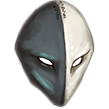In exploration mode, each player who wants to do something beyond just traveling chooses an exploration activity for their character. The most common activities are Avoid Notice, Detect Magic, Hustle, and Search, though there are many other options available (detailed on page 438 of
Player Core). The purpose of these activities within the game is to clarify what a PC focuses on as they explore rather than unrealistically allowing them do all things simultaneously. This adds variety within the group's behavior and can show you where players want the story to go. For example, a player whose PC is Investigating carvings on the walls shows you that the player wants those to be informative.
Exploration activities that happen continually as the group explores are meant to be narrative first and foremost, with the player describing to you what they're doing, and then you determining which activity applies and describing any details or alterations for the situation. If a player says, “I'm Avoiding Notice,” add more detail by asking what precautions they're taking or by telling them which passages they think are least guarded. Likewise, if a player says they're looking for traps and keeping their shield raised and covering the group's tracks, ask them which of these they are prioritizing to narrow down the activity. Consider the advantages and disadvantages of an activity given current circumstances. For instance, someone Scouting might encounter thin ice and fall through before their group can reach them, or someone Investigating ancient hieroglyphs might critically fail and lead the party in the wrong direction. This does not apply for exploration activities that are discrete and occur when the group is taking a pause or zooming in on a particular action, such as Treat Wounds. Characters can always drop out of a continual exploration activity to perform a discrete one (even if they are fatigued and can't sustain an exploration activity as they travel), and they can change activities at any time.
The main exploration activities described in
Player Core (pages 438–439) and what PCs can use them to accomplish are as follows.
- Avoid Notice (Stealth): Sneak around without being found (Player Core 438).
- Defend: Keep a shield raised (Player Core 438).
- Detect Magic: Repeat the detect magic spell (Player Core 323, advice on page 41).
- Follow the Expert: Improve your bonus with another tactic by following an ally's example (Player Core 438, advice on page 41).
- Hustle: Travel faster (Player Core 438).
- Investigate: Recall Knowledge of your surroundings (Player Core 439, advice on page 41).
- Repeat a Spell: Cast or sustain a spell over and over (Player Core 439).
- Scout: Look ahead for danger (Player Core 439).
- Search (Perception): Seek out hidden things as you travel (Player Core 439, advice on page 42).
Skills also have exploration activities linked to them.
- Borrow an Arcane Spell (Arcana): Prepare a spell from someone else's spellbook (Player Core 234).
- Coerce (Intimidation): Threaten a creature so it does what you want (Player Core 240).
- Cover Tracks (Survival): Obscure the PC's passing (Player Core 246).
- Decipher Writing (Varies): Understand archaic, esoteric, or obscure texts (Player Core 228).
- Gather Information (Diplomacy): Canvass the area to learn about a specific individual or topic (Player Core 239, DCs page 54).
- Identify Alchemy (Crafting): Using an alchemist's toolkit, identify an alchemical item (Player Core 237, DCs page 54).
- Identify Magic (Varies): Learn about a magic item, location, or ongoing effect (Player Core 230, DCs page 54).
- Impersonate (Deception): Using a disguise kit, create a disguise (Player Core 238).
- Learn a Spell (Varies): Use the skill corresponding to the spell's tradition to gain access to a new spell (Player Core 230–231, DCs page 54).
- Make an Impression (Diplomacy): Make a good impression on someone (Player Core 239).
- Repair (Crafting): Using a repair kit, fix a damaged item (Player Core 236).
- Sense Direction (Survival): Get a sense of where the PC is or determine the cardinal directions (Player Core 246, DCs page 54).
- Squeeze (Acrobatics): Squeeze through very tight spaces (Player Core 233).
- Track (Survival): Find and follow creatures' tracks (Player Core 246, DCs page 55).
- Treat Wounds (Medicine): Treat a living creature's wounds (Player Core 242).
Here are some useful things to keep in mind when adjudicating a few specific exploration activities.
This activity doesn't enable characters to automatically find every single magical aura or object during travel. Hazards that require a minimum proficiency can't be found with detect magic, nor can illusions of equal or higher rank than the spell.
When characters find something magical using this activity, let them know and give them the option to stop and explore further or continue on. Stopping brings you into a more roleplay-heavy scene in which players can search through an area, assess different items, or otherwise try to figure out the source of the magic and what it does. Continuing on might cause the group to miss out on beneficial magic items or trigger a magic trap.
Follow the Expert is a truly versatile activity that lets a PC who's lacking at a skill or exploration activity have a better chance to succeed. It provides a good way to help a character with a low Stealth modifier sneak around, to get a character with poor Athletics up a steep cliff, and so on. Usually, a character who is Following the Expert can't perform other exploration activities or follow more than one person at a time.
It's important that this doesn't become too rote. Let the players decide how one of them is helping out the other. The description can give you more to work with and add fun color to the exploration beyond just the mechanics. Also, if one PC helps another in the same way over and over, that could be a sign of the character being helped growing in a particular way. If the rogue has been helping the fighter Avoid Notice over and over, the fighter is essentially receiving training in Stealth at that point and might want to consider taking or retraining a skill increase to make that true. Connections like these can breathe life into the characters and their relationships, and it can help promote camaraderie and interactions between characters.
As with Searching or Detecting Magic, the initial result of Investigating is usually enough to give the investigator a clue that leads into a more thorough examination, but it rarely gives all possible information. For instance, a character might note that the walls of a dungeon are covered with Chthonian writing, but they would need to stop to read the text or even determine that it’s written in blood.
With a successful Perception check while Searching, a character notices the presence or absence of something unusual in the area, but this doesn't provide a comprehensive catalog of everything there. Instead, it gives a jumping-off point for closer inspection or an encounter. For instance, if an area has both a DC 30 secret door and a DC 25 trap, and a Searching character got a 28 on their Perception check, you would tell the player that their character noticed a trap in the area, and you'd give a rough idea of the trap's location and nature. The party needs to examine the area more closely to learn specifics about the trap, and someone would need to Search again to get another chance to find the secret door.
If an area contains many objects or something that will take a while to search (such as a cabinet full of papers), Searching would reveal the cabinet, but the PCs would have to examine it more thoroughly to check the papers. This usually requires the party to stop for a complete search.
You roll a secret Perception check for a Searching character to detect any secrets they pass that are hidden in a place that stands out (such as near a door or a turn in a corridor), but not one that's in a more inconspicuous place (like a random point in a long hallway) unless they are searching particularly slowly and meticulously.
The rules for Searching deliberately avoid giving intricate detail on how long a search takes. That's left in your hands because the circumstances of a search can vary widely. If the group isn't in any danger and has time for a really thorough search, that's a good time to allow them to automatically succeed, rather than bothering to roll, or you might have them roll to see how long it takes before they find what they're looking for, ultimately finding it eventually no matter the result. Conversely, if they stop for a thorough search in the middle of a dungeon, that's a good time for their efforts to draw unwanted attention!
PCs might get to attempt another check if their initial search is a bust. But when do you allow them to try again? It's best to tie this to taking a different tactic. Just saying “I search it again” isn't enough, but if a PC tries a different method or has other tools at their disposal, it could work. Be generous with what you allow, as long as the player puts thought into it! If you know a search isn't going to turn up anything useful, make that clear early on so the group doesn't waste too much time on it. If they're determined to keep going—which they often are—you might have them find something useful but minor in the search.
The list of exploration activities isn't exhaustive. More appear in special subsystems and adventures, and you'll often need to create your own. When making your own, it's usually fine to just consider whether the amount of effort the PC has to put in is comparable to the other exploration activities and go from there. If you're having trouble, try finding a comparable activity. For example, if the PC are Swimming as they explore, consider that travel speeds are based on the equivalent of 1 action per 6 seconds, and that other exploration activities the PCs can keep up without getting tired are generally based on alternating between 2 actions per 12 seconds, averaging to 1 action per 6 seconds. (Defend, for example, is based on using 1 action to Stride then 1 to Raise your Shield, which is why the PC moves at half Speed.) Hustle is a good example of an activity that can't be done indefinitely, so you can use it as a model for strenuous activities where the PCs are using the equivalent of 2 actions every 6 seconds.
When improvising an exploration activity, have in mind some advantages and disadvantages of that activity to inspire you. What else might the PC be neglecting while doing this activity? How does it interplay with activities that the rest of the party uses? If the new activity seems like it's a better option than other activities all or nearly all the time, chances are you might want to adjust it so it's more balanced. Eventually, you'll start to find which exploration activities your group enjoys the most.
 Licenses
Sources
Licenses
Sources
 Contact Us
Contributors
Support the Archives
Maximize Menu
Contact Us
Contributors
Support the Archives
Maximize Menu
 Licenses
Sources
Licenses
Sources
 Contact Us
Contributors
Support the Archives
Contact Us
Contributors
Support the Archives









